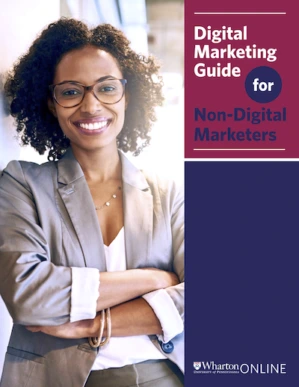
Since the advent of the internet, marketing has seen massive changes. An increasing number of businesses are shifting from old fashioned forms of advertising in favor of digital options, but traditional marketing still has its place. Here’s what chief executives in the C-Suite need to know about digital marketing versus traditional marketing.
What Is Digital Marketing?
Digital marketing is any form of marketing that utilizes the internet. Organizations use content, search engine optimization, emails, paid media, and social media to connect with potential customers.
In the past decade, digital marketing has exploded in popularity, as a result of the mass adoption of smartphones and the sharp increase in daily screen time. Digital marketing is all around us, from our email inboxes to our online video intake.
Examples of digital marketing include:
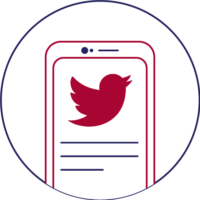

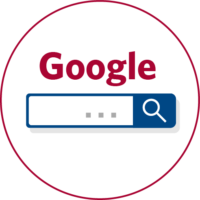


The benefits of digital marketing
Digital marketing is ideal for generating the best return on investment for marketing campaigns, with holistic analytics and interactivity. Marketers now have the ability to target audiences in an affordable and measurable way, and automating their campaigns dynamically.
“Instead of one-way interruption, web marketing is about delivering useful content at just the right moment that a buyer needs it.” -David Meerman Scott
The benefits of digital marketing include:
1. Measurable results
Marketing analytics have become incredibly sophisticated. Marketers can measure the results of their campaigns nearly immediately, with demographic breakdowns and insights traditional marketers lack. Many digital platforms and content management systems contain built-in analytics features, which provide holistic insights.
2. Instant interactivity
Digital marketing provides numerous avenues for customers to interact with your business instantly. In the past days of marketing and advertising, interactions had a much longer “pipeline,” and often required physical products to interact, such as mail-in forms.
“Virality isn’t luck. It’s not magic. And it’s not random. There’s a science behind why people talk and share. A recipe. A formula, even.” –Jonah Berger, Associate Professor of Marketing at The Wharton School, author of Contagious: Why Things Catch On
3. Advanced targeting and automation
The data from digital marketing analytics allows businesses to target their audience in ways traditional marketing never could. Additionally, automation tools and software make digital marketing scalable beyond what was once possible. Automation and direct targeting are the biggest difference between traditional marketing and E-marketing.
“Retailers are treating everyone the same way who walks in their stores and this doesn’t make sense in the world we livin where all customers are not equal.” –Peter Fader, Frances and Pei-Yuan Chia Professor of Marketing at The Wharton School, author of Customer Centricity: Focus on the Right Customers for Strategic Advantage
Download our eBook: The Digital Marketing Guide for Non-Marketers
The marketing industry has changed significantly over the years. Download our free eBook, “The Digital Marketing Guide for Non-Marketers,” to learn the fundamentals of digital marketing—from SEO and content strategy to paid advertising and social media tactics.
4. Better ROI
Return on investment (ROI) is perhaps the highest priority for marketers and businesses. Digital marketing cuts much of the steps, personnel, and friction out of the marketing and advertising process, making digital marketing much leaner than traditional marketing.
“Over the last several years, managers have come to embrace the notion that not only attracting new customers but also retaining them has a large impact on the corporation’s profits and long-term value.” –Raghuram Iyengar, Professor of Marketing at the Wharton School
Market where your customers spend their time
There was a time when the internet was used by a minority of Americans, but it has changed the way we work, play, and live our lives. Currently, 90% of Americans are internet users. In one decade, the daily amount of time Americans spend with digital media has doubled from three hours a day to six hours a day.
“When I took office, only high energy physicists had ever heard of what is called the World Wide Web…now even my cat has it’s own page.” -Bill Clinton, Next Generation Internet initiative, 1996
The mass adoption of the internet makes digital marketing the natural choice in the 21st century.
What Is Traditional Marketing?
Traditional marketing is promotions or advertisement that occurs without using the internet or digital media. This includes billboards, print advertisements, TV commercials, newspaper ads, radio, and telemarketing. As the name implies, traditional marketing is the “old fashioned” form of marketing, and has literally been around for millennia.
“It’s just pure scale. There are only so many people you can reach online, but there’s a massive segment of people who are still shopping offline, and you want to be able to address that market.” – David Bell, author of Location is (Still) Everything
Though digital marketing has taken over much of the advertising space, traditional marketing is still a contender that drives serious results, in the right situations. Digital marketing hasn’t replaced traditional marketing, but it has disrupted it.
The benefits of traditional marketing
In our easily-distracted culture, it can be easy to fixate on methods that get instant results. While digital marketing reaches a wider audience faster, there are notable advantages of traditional marketing has its notable advantages.
Advantages of traditional marketing include:
1. Traditional marketing resonates with older demographics
Though digital media has disrupted the way most Americans consume information, the familiarity of traditional marketing resonates with certain demographics, and the accessibility of traditional marketing is tried and true. A Luxury Institute report found that upper-middle-class baby boomers spent nearly twice as much time with traditional marketing media than their millennial counterparts.
2. Proven success rate
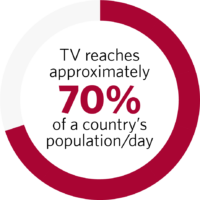 If traditional marketing didn’t get results, companies wouldn’t pay $5 million for a 30-second Super Bowl ad. According to Thinkbox, TV reaches approximately 70% of a country’s population a day, 90% in a week, and nearly everyone in a month. Bizo and Epsilon data found that direct mail achieves a 4.4% success rate, compared to 0.12% for email.
If traditional marketing didn’t get results, companies wouldn’t pay $5 million for a 30-second Super Bowl ad. According to Thinkbox, TV reaches approximately 70% of a country’s population a day, 90% in a week, and nearly everyone in a month. Bizo and Epsilon data found that direct mail achieves a 4.4% success rate, compared to 0.12% for email.
3. Local advantage
 Event marketing and local marketing have advantages over digital in specific occasions. According to Bizzabo, 41% of marketers believe that events are the single most effective channel over digital advertising, email, and content marketing. Additionally, businesses can see results with local newspapers advertising to amplify their campaigns.
Event marketing and local marketing have advantages over digital in specific occasions. According to Bizzabo, 41% of marketers believe that events are the single most effective channel over digital advertising, email, and content marketing. Additionally, businesses can see results with local newspapers advertising to amplify their campaigns.
Using Digital and Traditional Marketing
An increasing number of businesses are turning to digital marketing for their advertising needs, but traditional marketing still has its time and place. Rather than choosing one form of marketing over the other as a binary, successful marketers are combining traditional and digital advertising methods to amplify their results.
Tidings advocates traditional marketing as a core part of their Local Marketing Stack, but only after numerous digital marketing developments are in place. Businesses should synergize digital and traditional marketing to get the most results for their specific situation.
Learn More
For more information on digital marketing best practices and strategies, download our free eBook Digital Marketing Guide for Non-Marketers.
For marketing insights and further education, enroll in Wharton’s Digital Marketing Certificate Online today.



